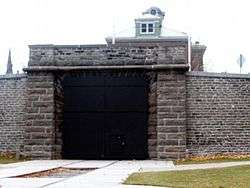Brockville Tunnel

The Brockville Railway Tunnel is Canada's first railway tunnel. It is located beneath the city of Brockville, Ontario and passes under the building to the north, built in 1863–64 as the Victoria Hall, but remodelled as the Brockville City Hall after 1904.
The tunnel runs in a north/south direction from Water Street, for a distance of 527 m (1,730 ft). It was built by the Brockville and Ottawa Railway. Construction on the tunnel began in September 1854, but was not opened for rail traffic until December 31, 1860. The tunnel was designed to provide a rail link from the timber trade of the Ottawa Valley to the Brockville port facilities on the St. Lawrence River ship route.
The Brockville and Ottawa Railway, incorporated in 1853, ran from Brockville, through Smiths Falls, to Sand Point, near Arnprior, with a branch line from Smiths Falls to Perth.[1] Its first B&OR train left Brockville on January 25, 1859, almost two years before finances permitted completion of the tunnel. The Brockville and Ottawa Railway amalgamated in 1878 with the Canada Central Railway, which was absorbed in 1881 by the Canadian Pacific Railway (CPR).
The rail line through the tunnel was later used by special height-shortened steam engines, and then diesel trains into the mid-1970s. The rails and ties were then sold and removed in the 1980s, and the railway tunnel was no longer used as it was built. In 1982, the tunnel was turned over to the City of Brockville by Marathon Realty, the real-estate wing of the Canadian Pacific Railway.
In 2016–17, the railway tunnel underwent a major interior rehabilitation to make it possible for citizens and visitors to travel safely on foot through it, from the south portal to the north portal, coming out at the north-end gorge and ramp to the street level.
The railway tunnel has been receiving thousands of visitors since it opened completely on August 12, 2017. The tunnel now features a modern LED coloured light system, which is programmed in various ways, along with a recorded music track playing while one walks through.
Adjacent to the tunnel is a refurbished CPR caboose or van, that was donated in 1987 to the city by the Canadian Pacific Railway. A detailed plaque,[2] in both English and French, describes the details and story of how cabooses were formerly part of every train. Today the caboose operates as an escape room experience.
References
- ↑ The railway arrives in Smiths Falls Archived May 25, 2014, at the Wayback Machine., Railway Museum of Eastern Ontario
- ↑ Plaque Archived March 4, 2016, at the Wayback Machine.
External links
- The Brockville Tunnel Historic Plaque
- Official website
- TripAdvisor page on the Brockville Railway Tunnel
Coordinates: 44°35′23″N 75°40′55″W / 44.58972°N 75.68194°W